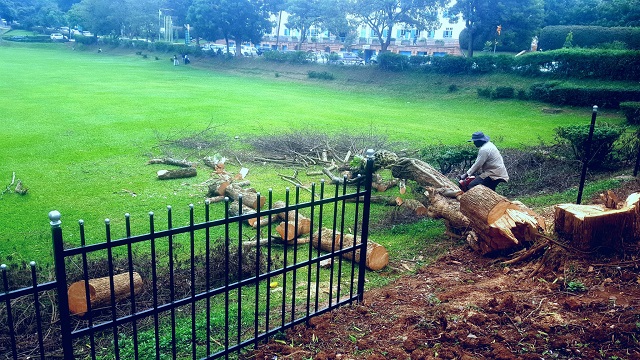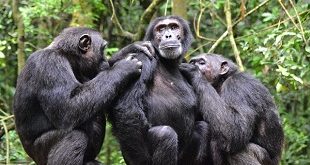
Kampala, Uganda | THE INDEPENDENT | Environmentalists have protested against the cutting of trees at Makerere University.
The action by the University Estates department on Thursday and Friday has left hundreds of birds ranging from cattle eaglets locally known as Enyange and Marabou stocks (Kalooli) dead while others displaced.
Some of the trees cut were at the former Faculty of Arts where some of the branches that were providing shade.
Dr. Gerald Eilu, a Forest Biology and Ecosystems Management lecturer at Makerere University says that it is wrong for the university management to cut the trees especially during the breeding season for the birds.
He argues that ecological studies have already been done to ascertain when the birds are breeding, which he says university authorities should have considered much earlier.
Currently, cattle eaglets and marabous are predominantly breeding on trees on Makerere Main Campus trees. The breeding season for the birds, according to Dr. Eilu coincides with the grasshoppers, which form part of their food.
“I think the nesting here on campus is because I mean it’s one of the refuges that they can find some protection. Out there, the environment is quite hostile. It’s unfortunate that even here, the poor birds are experiencing such injustice,” Dr. Eilu said on Friday.
The cattle eaglets have built colonies on trees where there are marabous. Dr. Eilu explains that this could be for protection.
“Certainly, Marabous have chosen some of the most suitable trees for nesting but when these smaller ones the cattle eaglets are also nesting in the same trees, then they are afforded some protection because they wouldn’t be at a very big risk by the birds of prey and other enemies,” Dr. Eilu explains.
Dr. Eilu wants management and ecologists to work hand to ensure improved interrelationships between organisms and their environments.
Associate Professor Edward Nector Mwavu, the newly elected Head of Department of Forestry, Bio-Diversity and Tourism said some of the things that were done at Makerere makes them ashamed as trainers of environmental conservation.
“Makerere where you have a diversity of disciplines and we are also signatories of various international covenants on biodiversity, we would not be seen butchering birds like this. If we feel that these birds are perhaps a menace, we would seek for relocation rather than killing them,” Professor Mwavu says.
He argues that the two birds that have largely experienced the wrath of pruning are beneficial to the environment. He argues for instance that marabous eat solid waste aiding in cleaning the community while the cattle eaglets help in controlling pests on livestock.
Professor Mwavu says some of the actions are done without consultations.
Dr Paddy Musana, from the Makerere Religion and Peace Studies department says they called for the pruning of the trees because the birds had littered the entire place causing a foul smell.
He argues that sometimes bird droppings fall on community members while walking. While he sympathizes with birds and conservationists’ arguments, he says the way pruning is done should be a concern of the conservationists.
According to a 2017 study by Professors Michael Kibuule and Derek Pomeroy from Makerere’s Department of Zoology whose findings were published in Ostrich, a Journal of African Ornithology, several thousand birds start breeding each season around November.
Research also shows that traditionally, a bird of savannahs, breeding and growing young birds are timed in the nest during the December to February, a drier period, when food for scavengers is expected to be more abundant.
Dr. Musana argues that technical people in ecology should always guide management in understanding the behaviour of the birds especially their time of breeding.
The breeding population of Marabou Stocks has increased in Kampala, from 11 pairs in 1969 to more than 1,200 breeding pairs as of 2016 according to the Journal.
But this is not the first time, Makerere is at conflict with ecologists over the birds. In 2014, university authorities cut down several trees citing they had out-lived their usefulness, hence posing danger to the buildings.
******
URN
 The Independent Uganda: You get the Truth we Pay the Price
The Independent Uganda: You get the Truth we Pay the Price



